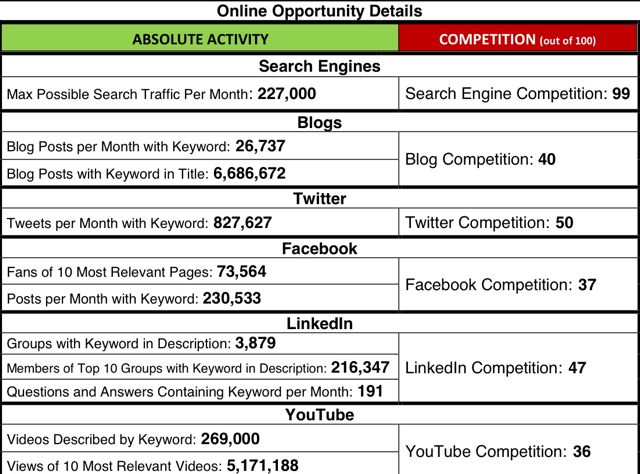 Any insurance marketer looking to get involved in online marketing should take the time to analyze the value of the keyword "insurance." Some basic analysis of the keyword “insurance” can be found in the free Hubspot ebook titled Online Marketing Opportunity Report: Social Media, Blog and Search Engine Activity.
Any insurance marketer looking to get involved in online marketing should take the time to analyze the value of the keyword "insurance." Some basic analysis of the keyword “insurance” can be found in the free Hubspot ebook titled Online Marketing Opportunity Report: Social Media, Blog and Search Engine Activity.
For insurance marketers, this ebook can be used to create a snapshot of how many online actions take place for "insurance" and the level of competition for that keyword within specific online channels. The chart below shows data for the keyword “insurance."
 HubSpot.com "Online Marketing Opportunity Report"; Page 30 "Analysis of (Keyword) Insurance"
HubSpot.com "Online Marketing Opportunity Report"; Page 30 "Analysis of (Keyword) Insurance"
What you are looking at in this chart (HubSpot explains):
"Activity numbers were recorded at a single point in time and represent a snapshot that will change. The raw activity numbers are directly recorded and then extrapolated in some instances to give estimates for longer time frames such as a month."
"The competition rating is generated using proprietary HubSpot algorithms that give a measure of how crowded or saturated a particular channel is for the keyword “insurance.” A competition score of 50 represents an average level of competition."
Formulating Insurance Marketing Strategies for Each Channel
Understanding how to formulate an insurance marketing strategy around this data is critically important. Interpreting activity levels and competition incorrectly can lead to misguided online marketing strategies. Below is a basic interpretation of the data for "insurance" and some preliminary thoughts on how to implement an online marketing strategy based on that word. Guidelines for interpretation and strategy based on keyword analysis are dealt with in much greater detail in HubSpot's free Online Marketing Opportunity Report: Social Media, Blog and Search Engine Activity by Industry. I recommend downloading a copy and reading the whole thing.
Insurance Search Engine Marketing Example
Question: Is it a good idea to launch a search engine ad campaign focusing on the keyword “insurance?"
Answer: NO (based on interpretation of data presented in above chart)
Why: The fact that the keyword “insurance” has significant traffic might lead you to believe that it’s a good keyword to pursue in a search engine campaign. However, it also is highly competitive (99%). That means it is a word you should most likely stay away from, unless you are already an online marketing powerhouse. A better strategy might be to create a group of relevant keywords that are selected because they have a decent amount of traffic and are only moderately competitive. Instead of “insurance,” you may want to focus on building a keyword group including “insurance programs” or “D&O insurance” or “insurance solutions,” all words with moderate traffic and moderate to low competition.
Insurance Social Media Marketing Campaign Example
Question: Is it a good idea to launch a blog or implement a social media strategy utilizing Twitter, Facebook, LinkedIn and YouTube, with each channel focusing on the keyword "insurance?"
Answer: YES, YES, YES, YES & YES (based on interpretation of data presented in above chart)
Why: Blogs, Twitter, Facebook, LinkedIn and YouTube all present abundant opportunity for insurance marketers wishing to focus on the keyword “insurance.” For each of these channels there is a reasonable amount of activity for “insurance,” but the competition is average to below average.
Blogs. We already know from the search engine numbers in the chart above that people are searching the keyword “insurance.” To gain blog readers/subscribers, your job is to consistently create relevant "insurance" content that is optimized for search engines. Relevance and consistency are keys to blogging success.
Twitter. To gain Twitter followers with the keyword “insurance” you can promote your blog posts via links within your tweets, and also share links to relevant “insurance” articles written by others. Another good strategy is writing frequent 140-character “insurance” tweets that focus on a single interesting fact (i.e., a premium volume milestone for your company, a link to a hurricane emergency claims website, information on a charity event sponsored by your company, etc.)
Facebook. To gain Facebook fans utilizing “insurance,” you can do everything suggested for Twitter, plus you have the wiggle room to get a bit more creative. You can test special offers, contests and surveys to help gain fans.
LinkedIn. Building connections in LinkedIn utilizing “insurance” will most likely revolve around LinkedIn Groups and LinkedIn Answers. Both can be powerful lead generators if your participation is consistent.
YouTube. Gaining viewers/subscribers on YouTube utilizing “insurance” may take the most effort. A video blog on “insurance” issues is a reasonable way to get started. You can also feature your insurance company television ads on YouTube. Commercials are very popular, especially if they are funny or quirky. About a year ago, State Farm Insurance Company used YouTube to great effect when it sponsored a music video for the pop group OK Go. To date, that YouTube video has more than 25 million views. State Farm is clearly acknowledged at BOTH the beginning and the end of the video. See for yourself:
Insurance Marketing Online Opportunity Summary
Because the keyword “insurance” has reasonable levels of activity across the Internet and average to below average competition within the most popular online channels, the opportunities for insurance company marketers are significant. As HubSpot states: “Establishing a 'first mover' (or even a 'second mover') advantage in areas where competition is low and activity is reasonable can result in success.”
